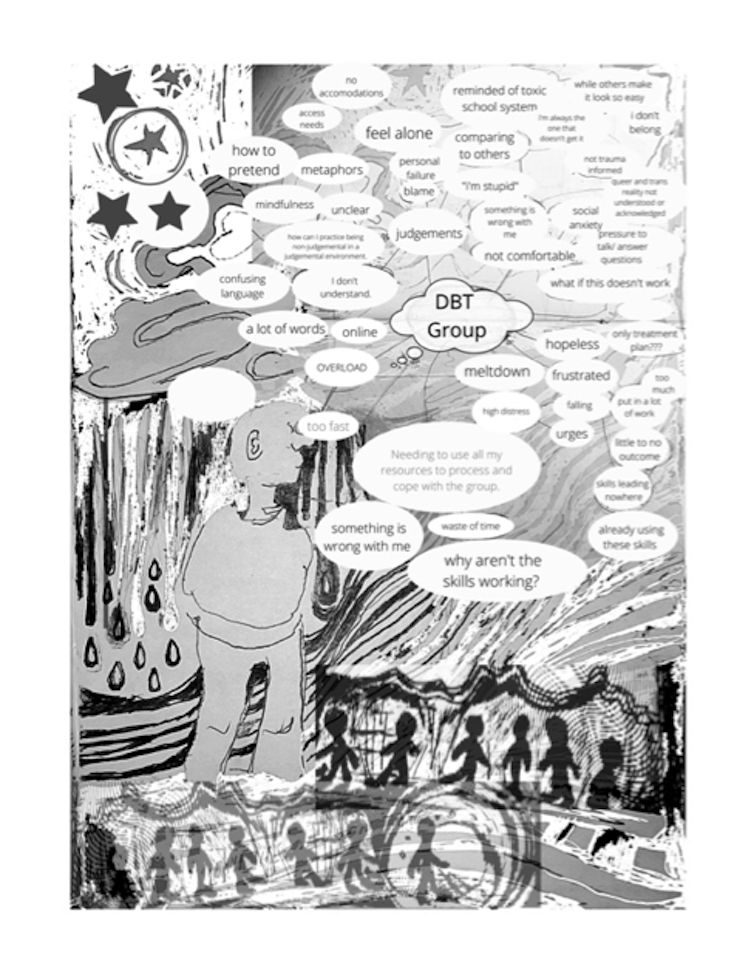
Patty Douglas, Brandon University and Michael Orsini, L’Université d’Ottawa/University of Ottawa
April is World Autism Month. It kicked off on April 2 — World Autism Awareness Day — launching a month of activities and events across the world including the Autism Speaks’ Light It Up Blue campaign. Each year, key landmarks across Canada and the globe, including Toronto’s CN Tower, Ottawa’s Peace Tower and Vancouver’s B.C. Place light up blue to promote public awareness and understanding.
What could possibly be wrong with a campaign to sensitize the public to autism?
World Autism Month and Light it up Blue have been the subject of protest from autistic self-advocates and organizations such as Ontario’s Autistics for Autistics and the national group, Autistics United Canada.
Self-advocates point to the absence of autistic leadership in awareness campaigns and describe how the powerful advocacy organizations that fund them — led primarily by non-autistic people — continue to portray autistic people negatively as mysterious puzzles to be solved. They continue to focus on cures for autism or therapies that aim to “fix” autistic people.
At first blush, it might seem that autism organizations are finally heeding the concerns of autistic self-advocates. Words such as “inclusion,” “diversity,” “acceptance” and “understanding” pepper their campaigns. Yet these organizations persist in advancing the rhetoric of autism as a burden and disorder and often exclude autistic people from leadership.
As allies, parents and critical autism researchers, we understand the dire need for awareness, advocacy and research. Findings from our Re•Storying Autism project show autistic children and adults experience higher rates of bullying, mental health struggles, misunderstanding, inferior education, underemployment and even premature death.
Families struggle with the stigmatizing effects of misunderstanding and the lack of meaningful or culturally relevant help. This is especially true for racialized autistic people and families, who face compounded forms of exclusion and harm.
Instead of communicating care or concern through awareness campaigns and lighting it up blue this year, consider learning about initiatives led by autistic people such as #RedInstead, Autism Acceptance Month and others. Here are five things that autistic people have been saying for years that require the attention of those who claim to intervene in the name of autism:
1. Awareness
The idea that “awareness” of autism is needed suggests there is widespread ignorance of the existence of autism. The explosion of autistic self-advocacy, social media presence and representation in mainstream media and television shows like Atypical suggest otherwise (though mainstream media still limits diverse representation).
Autism was once considered a rare condition, but one would have to be vastly disconnected to be unaware of it today. Instead of awareness, we need to challenge the ableism of autism awareness campaigns, advocacy and research — the persistent barriers and attitudes that value and favour able-bodied people. This devalues and excludes embodied difference, or only considers autism as something that must be “overcome.” People don’t get over autism — they live with it. And many live with it joyfully.
2. Perspective
A focus on autism awareness privileges the perspectives of non-autistic people. The organizations that support awareness such as Autism Speaks, are run mainly by non-autistic people and rarely include autistic adults.
Challenging ableism also means challenging the leadership and power of campaigns such as Light It Up Blue for autism and World Autism Day. Rather than focus on charitable organizations and “helping,” we need to turn our attention to self-advocacy, alternative activities, forms of support and research led by autistic people themselves.
3. Leadership
Much work is needed to achieve accessible and culturally relevant policies and practices for autistic children and adults, the latter of whom are frozen out of policy considerations. The continued lack of guidance and leadership from autistic people serves as a painful reminder that lives that deviate from what constitutes “normal” are only included on terms dictated by those policing the boundaries of what is considered “normal.”
Taking seriously the perspectives advanced by autistic people, means asking them what types of supports can make a qualitative difference in their lives. It means turning to the vast body of work by speaking and non-speaking people who identify as autistic. It means moving the focus away from blue lights, ribbons or other gimmicks, and working towards a sustained challenge to systemic ableism.

4. Neurodiversity
Becoming knowledgeable or informed about autism means appreciating the vast differences among autistic people and the many varieties of what it means to be autistic. Not all autistic people are alike and, thankfully, there are also many viewpoints. Troubling tropes of autism as a disorder and burden must be left behind, and replaced by a form of neurodiversity that embraces diversity.
5. Inclusion
We need to recognize and rectify the persistent exclusion of perspectives and initiatives advanced by members of Black, Indigenous and People of Colour (BIPOC) communities from autism awareness campaigns, as well as diagnosis and support. This includes embracing different cultural understandings of autism that depart from a western biomedical lens focused on deficits.
This April, and every month, we urge you to reconsider the meaning of World Autism Month from the perspective of autistic people themselves.
This article was co-authored by Estée Klar, a PhD in Critical Disability Studies and Neurodiversity and an artist. She is the former founder of The Autism Acceptance Project in Canada (2005-10) and is presently co-collaborator with her non-speaking son/poet/artist, Adam Wolfond, and other speaking and non-speaking neurodiverse people at dis assembly: a neurodiverse arts collective.![]()
Patty Douglas, Associate professor Disability Studies and Inclusive Education, Brandon University and Michael Orsini, Professor, health policy, disability, public policy, social movements, L’Université d’Ottawa/University of Ottawa
This article is republished from The Conversation under a Creative Commons license. Read the original article.

